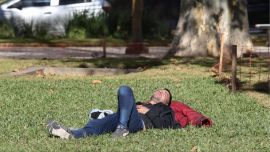A landslide win in regional elections against a fractured opposition shows that the socialist government of President Nicolás Maduro is prevailing in Venezuela despite an economy in shreds and months of protests, analysts said.
Analysts point to the left's powerful ability to mobilise its voter base, helped by opposition abstentionism and dirty tricks denounced as illegal by the opposition.
But how does Chavismo – the name for the Bolivarian ideology and government style of late president Hugo Chávez – continue to prevail when its chief exponent, Maduro, has an 80 percent dissatisfaction rating and the country has become an economic wasteland?
Political analyst Luis Vicente Leon told AFP that the government's 54 percent overall share of the vote in Sunday's poll represents a bedrock of support of about 32 percent of the electorate.
"Chavistas unified to protect themselves. They faced a fractured and discouraged opposition," he said, referring to the failure of anti-Maduro street protests that between April and July claimed the lives of 125 people.
Those protests waned amid food and medicine shortages, exhaustion, and street frustration over an increasingly fractured opposition leadership.
In Petare, Venezuela's largest favela in Miranda state, a sudden surge of support for the government ousted governor Henrique Capriles, a former presidential candidate and a standard bearer for the right-wing opposition.
The government took 18 governorships in all. The opposition, which had been tipped to win as many as 18, won only five, and cried foul over dirty tricks which included the last-minute relocation of 274 polling stations from pro-opposition areas.
Jose Yanezl, a 72-year-old who lives with his sister in a hut with a metal roof, doesn't blame Chavismo for Venezuela's crippling shortages.
"It's not Maduro's fault if a kilo of sugar costs 27,000 bolívars" (US$8 dollars at the official rate), he said.
For him the culprit is the opposition, who became "accomplices in the economic war" by monopolising household staples to cause shortages and speculation.
Explaining his support for Chavismo he said: "In what country in the world does a government build 1.8 million houses for the poorest people?"
"We are hungry, sometimes we only eat one meal a day, but we continue to resist because of the good man," he said, referring to Chávez, who died in 2013 after handpicking Maduro as his successor. "He knew how to give love and the poor recognise it. I will remain a Chavista till I die."
Cristobal Ramírez, wearing a red T-shirt with Maduro's image, said he had once thought of voting for the opposition, but quickly changed his mind.
"I never heard them speak to the poor. If they treat us badly without being in government, what would they do if they won? They would kill us."
"While they (the opposition) hide the food from us, the government is reaching out to us with food," said Ramírez, 67, referring to food cartons at subsidised prices.
Sunday's vote drew the ire of the world powers including the United States, which said it was neither free nor fair.
But veteran opposition leader Henry Ramos Allup said the opposition Democratic Unity Roundtable (MUD) was also "terribly affected" by absentee voters among its support base.
The MUD totalled 4.8 million votes, "three million less than in the parliamentary elections in 2015," said Ramos Allup, who leads the Democratic Action party that took four of the five governorships won by the MUD coalition.
Electoral expert Eugenio Martínez told AFP the opposition won about 700,000 votes less than in 2015 because its strong voter base in the capital Caracas, which has separate mayoral elections, was not part of Sunday's vote.
In contrast, the government's tally of 5.5 million votes hardly changed since 2015, when it polled 5.6 million.
"If we have to give our lives for the revolution, we will give them, because we see that it helps the people," said Eddie Mesa, 55, head of the local neighbourhood association in Petare.
"It is a revolution that loves the poor" because of its social programmes and subsidies, he said.
He said he was angry at the opposition for provoking foreign sanctions that have aggravated the economic crisis.
"There is an induced economic war and a United States embargo," he said.
Referring to the opposition he said: "They wanted a social explosion, but the patient, patient people hit back with a vote of punishment."
- TIMES/AFP


























Comments